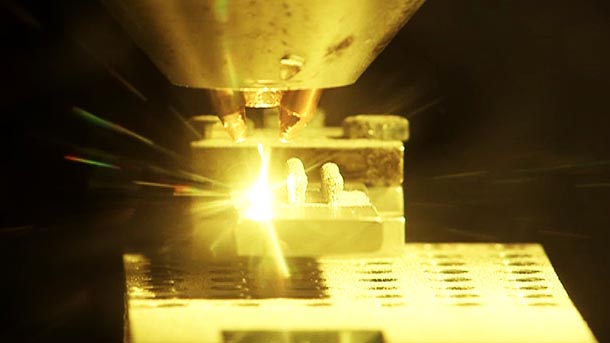
3D printing with metal has numerous applications in industries like jewelry, medical, dental and manufacturing.
Penn State to offer new additive manufacturing and design graduate degrees
4/14/2017
UNIVERSITY PARK, Pa. — In response to increased industry demand for experts in the growing field of additive manufacturing, Penn State will offer residential and online master’s degrees in additive manufacturing and design (AMD) beginning in fall 2017.
The residential Master of Science in Additive Manufacturing and online Master of Engineering in Additive Manufacturing are 30-credit degrees that are designed to provide the analytical and practical skills required to digitally design, develop, analyze, numerically model, optimize, fabricate and inspect new components and subassemblies using additive manufacturing technologies.
Additive manufacturing (also known as 3D printing) is redefining how components are designed, manufactured and certified. Building 3D parts layer-by-layer using additive manufacturing gives engineers unprecedented design freedom to create lightweight structures, consolidate assemblies of components into a single 3D printed part and functionally grade structures to improve performance. This is generating considerable interest in a wide range of industries, including aerospace, consumer goods, energy, medical, oil/gas and space.
To meet these diverse needs, the program will integrate graduate coursework across multiple departments, including Mechanical and Nuclear Engineering, Industrial and Manufacturing Engineering, Engineering Science and Mechanics, School of Engineering Design, Technology, and Professional Programs, and Materials Science and Engineering; and across two colleges, Engineering and Earth and Mineral Sciences.
Students can choose from complimentary engineering courses covering a variety of topics to fulfill the degree program, including existing courses from programs in engineering leadership and innovation management, mechanical engineering, and human factors and ergonomics. Additional elective courses will also be made available in the Smeal College of Business and College of Information Sciences and Technology to understand and explore the implications of additive manufacturing on supply chains and cyber-security.
“The faculty involved in delivering these courses at Penn State are anxious to advance the education of new graduates as well as practicing engineers in the rapidly expanding field of additive manufacturing. In developing this graduate degree program, we included design for additive, based on the strong guidance from our industry friends. Industry wants to make sure engineers think differently about designs to capitalize on the opportunities that additive manufacturing allows,” said Karen Thole, head of the Department of Mechanical and Nuclear Engineering, where the degrees will be housed.
The AMD program will provide unique hands-on experiences in all aspects of the additive manufacturing process. All students enrolled in the program, whether resident at University Park campus or online, will be required to spend time on site, working in Penn State’s state-of-the-art additive manufacturing laboratory, the Center for Innovative Materials Processing through Direct Digital Deposition (CIMP-3D), as well as the Material Characterization Laboratory in the Millennium Sciences Complex and the Factory for Advanced Manufacturing Education in the Harold and Inge Marcus Department of Industrial and Manufacturing Engineering. Students will gain experience working with polymer as well as metallic additive manufacturing systems.
Tim Simpson, Paul Morrow Professor of Engineering Design and Manufacturing and co-director of CIMP-3D, will serve as director of new program.
“We are excited to launch the first multidisciplinary graduate-level program in additive manufacturing and design in the country, and in the world as far as we can tell. It has been great working with all five departments to establish this program based on coursework and hands-on labs that we have been offering for nearly five years now,” Simpson said.
The master’s programs in AMD will prepare students to:
- Apply foundational knowledge, critical thinking, problem solving and creativity in the uses of additive manufacturing and associated design tools and methods.
- Grow as leaders in manufacturing while maintaining the highest ethical standards in applying additive manufacturing to industry-relevant problems and design challenges.
- Strive for the advancement of the state-of-art in additive manufacturing and design.
- Develop innovative solutions through new design paradigms in their respective industries.
“Feedback from industry leaders in the field has been overwhelmingly positive, particularly with our focus and emphasis on design. Everything we make today was designed to be made with traditional manufacturing processes such as casting, machining and forging. The real power and potential for 3D printing technologies is only achieved when you design things to be additively manufactured,” Simpson said.
Pending presentation to the Board of Trustees, the degrees will launch in fall 2017. For more information about the degrees or to be alerted as to when applications are available, please email AMDprogram@psu.edu.



